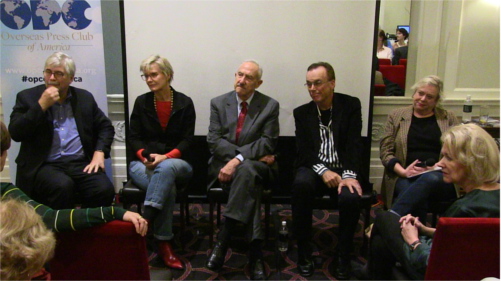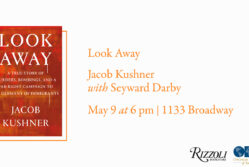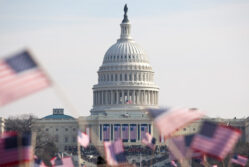Event Coverage Highlight

OPC Panel Marks 30th Anniversary of the Opening of the Berlin Wall

Left to right: John Daniszewski, Carroll Bogert, Jonathan Kapstein, Andrew Nagorski and Deidre Depke. Photo: Chad Bouchard
Scroll down to watch a playlist of video clips from the OPC YouTube channel, and a slide show of images from 1989 taken by David Turnley and his brother Peter Turnley.
by Emily Brown and Chad Bouchard
The world observed a seismic shift of history when the Berlin Wall opened on Nov. 9, 1989, as images and reporting from journalists on the ground showed throngs of residents celebrating the end of a divided city, sparking hope and optimism across the East and West.
Thirty years later, during an OPC panel to mark the anniversary of the wall’s opening, journalists who covered events before and afterward, including the cascade of upheavals that followed in the Soviet Union, the Eastern Bloc and elsewhere, gathered to recount their experience, and reflect on a knotty legacy.
“Taken together, it marked the beginning of the end of the Soviet empire and the Cold War, and I guess I would argue the true end to World War Two,” said OPC past president Deidre Depke, executive producer of The Takeaway, who moderated the discussion. “We can trace the birth of the European Union and the current political turmoil in Europe directly to those events.”
She was joined by panelists Carroll Bogert, John Daniszewski, Jonathan Kapstein, and Andrew Nagorski, who provided their insights into what life was like in East Germany and other Eastern Bloc countries, what led to the opening of the wall, and how it changed the world.
Nagorski, a journalist who spent more than three decades as a foreign correspondent and editor for Newsweek, talked about events across Europe leading up to November 1989.
“By the 80s, there were an increasing number of movements that were challenging the system from within,” he said. “I compare this a little bit to a five-act play. Act one is in Poland, where there had been martial law in the beginning of the 80s, the attempts to keep suppressing Solidarity and keep the economy going. All of that failed.”
Nagorski lived in West Germany in 1987, the year Ronald Reagan delivered the famous speech in which he demanded “Mr. Gorbachev, tear down this wall!” He said Reagan’s remarks were met with skepticism by Eastern Europeans. “Who is this crazy American who thinks that the wall can fall?”
Jonathan Kapstein covered the opening of the Berlin Wall while serving as Brussels regional bureau chief for Business Week magazine. He described the chaotic atmosphere in Berlin on Nov. 9.
“The sense of euphoria was intense,” he said. “I arrived in the evening and went promptly to the wall. There were parties everywhere. Ad hoc groups, church groups, drinkers, and you could hear everything, the sound on the other side of the wall of East German military engineers, crossing what was called the ‘death strip,’ removing the mines, removing the inner curtain wall and clearing a path.”
Kapstein said over the following days, many people climbed the wall as officials tried to keep people safe by blocking access with trucks. He recalled while crossing to East Germany he saw holsters of formerly armed border police were empty. Around 800,000 East Germans crossed over the border in the first 24 hours, he said. “And by the way 20,000 didn’t go back. They stayed right then and there.”
John Daniszewski, vice president and editor-at-large for standards of The Associated Press, talked about covering the Romanian Revolution and the fall of Nicolae Ceausescu in December 1989.
“I think Romania was the most oppressive, in an ironic way, because Ceausescu held himself up as a bridge between East and West, and yet he ran the most repressive dictatorship in the Eastern Bloc,” he said. Unlike in other Eastern European countries, where the leaders “saw the writing on the wall,” Romanian leaders weren’t going down without a fight.
“[Ceausescu] was determined to hold on to power, and he was willing to use firepower to do it.” Daniszewski himself was shot during the violence of the Romanian Revolution.
Daniszewski also talked about the reaction of Western leaders to the opening of the wall. “Gradually, there was a sense of triumph,” he said, after an initial period of Western hesitance. “As it gradually became more clear what the people of Eastern Europe wanted to be, which was European, the logic of maintaining a divided Germany and a divided Europe evaporated.”
The panelists discussed the current state of both Russia and Germany in global affairs. With Britain on the verge of leaving the European Union, power in the EU is shifting eastward and the value of the euro is linked primarily to the performance of the German economy.
“Germany and the Deutsche Mark are now the winners of the last half-century,” Kapstein said.
Carroll Bogert, president of The Marshall Project, who covered the collapse of the Soviet Union for Newsweek from Moscow, recalled her experience covering events in Beijing’s Tiananmen Square in 1989. She said part of the reason protests lasted so long in China was because students were waiting for a visit from Mikhail Gorbachev, so they could speak to him and to international media about their desire for glasnost-like opening of their government.
She said for her, covering events in Tiananmen served as a warning of what could happen in Moscow during the collapse of the Soviet Union.
“It was not inevitable that communism fell in 1989,” Bogert said, “And the reason that it did [fall] is that Gorbachev was unwilling to use force, and Deng Xiaoping was. And that is, I believe, the critical difference. Had Gorbachev used force, things could have been different in Eastern Europe and Soviet Union.”
“I just want to throw out there for everyone’s consideration the idea that actually, we lost the Cold War,” Bogert added. “That we lost it together with the Soviet Union. And we lost it because we bankrupted our country building what Eisenhower rightfully called the military industrial complex, which was not dismantled in the wake of the end of the Cold War. But not only that, we allowed ourselves a kind of triumphalism about the victory of our system.”
She said notions of universal health care and education, as well as the need to reign in capitalism rather than let it be unbridled, were discredited by the idea that President Ronald Reagan was the hero of the Cold War, and fostered “a system that was so sure of its own rightness that it became unwilling to change and to consider many of the social programs that might have made American capitalism a little bit less cruel. And I think it has not been good for our country to think of ourselves as victor in the Cold War.”
The program included a montage of audio clips from coverage 30 years ago, as well as a presentation of photos from David Turnley and his brother Peter Turnley, who were on the ground during the opening of the wall in November 1989.
“It was only 30 years ago, but it seems like another lifetime ago, doesn’t it?” Depke remarked after the slide show. “Looking at those pictures of faith and hope and optimism makes me sad.”
Scroll down to watch the Turnley photo slide show on Vimeo or click here. David is a photographer who won the Pulitzer Prize for his work in 1989 covering the opening of the Berlin Wall and other revolutions that year. He has won three OPC awards, including the Robert Capa Gold Medal in 1989 for covering revolutions in Romania and China for Black Start and the Detroit Free Press. Peter’s photos have been on the cover of Newsweek magazine more than 40 times. He has won numerous awards, including the OPC’s Olivier Rebbot Award for best photographic reporting from abroad in 1989 for the Newsweek story “Ceausescu, the fall of a dictator.”


